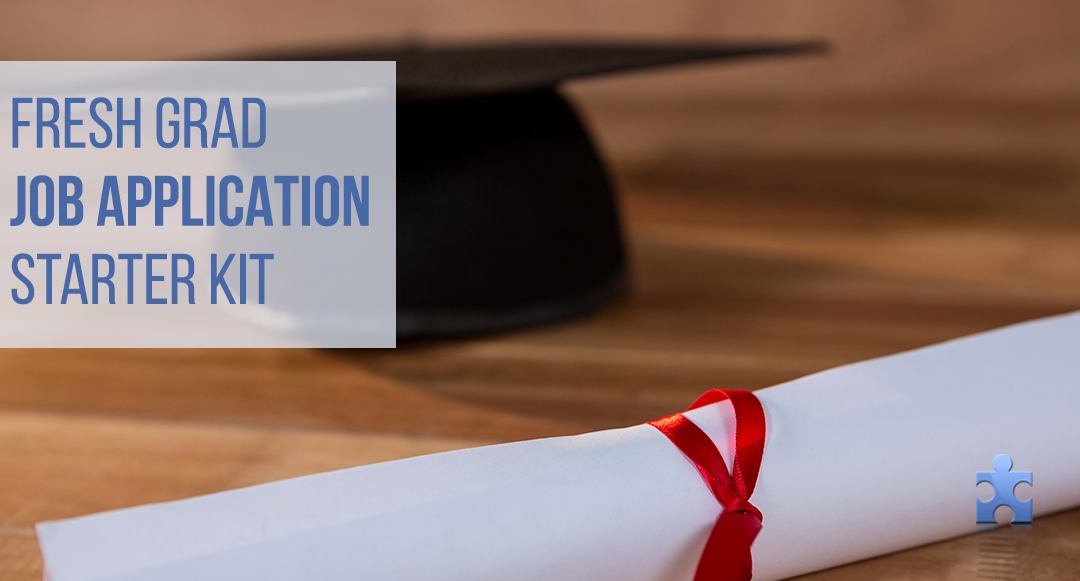Congratulations to the grad-waiting students! You are now close to being free from nerve-racking recitations, lengthy papers, and torturous examinations.
But of course, you will become unemployed and a member of the 9.1 million Filipinos looking for jobs. Technically, you have to be out of a job for more than 6 months to be considered officially unemployed, so, let’s not wait for that to happen, right?
Are you ready to take on the challenges of job hunting? You have to prepare for it ahead of time.
I know you are anxious about this whole ‘facing-real-life’ thing. Chill ka lang. Over a year ago, I was in your shoes, too. The transition might not be smooth, and a little bit scary, but you’ll get through it. I promise.
Applying for a job is, in fact, one of the most exciting yet difficult experiences everyone has to go through. Your journey from the gates of your alma mater to your first job is a humbling, learning experience. You will realize that after every interview, may it be a success or a failure, you are growing.
Do you know what beats anxiety and fear? Preparation – the preparation that comes from knowing what to expect and what to do in the so-called ‘real’ world. So, here’s a few reminders, tips, and other application necessities you will need on your journey to your first job. Good luck!
1. Secure Your Academic and Personal Credentials
Before you start writing your curriculum vitae and your resume. I advise you to secure copies of your academic and personal credentials.
Academic credentials include your official transcript of scholastic records, certificates and certifications, diploma (it usually takes 6 to 12 months before you can secure a copy of your diploma), and other pertinent documents that may prove you have successfully finished the requisites of your degree, course, or training.
Personal credentials, on the other hand, include your birth certificate issued by the Philippine Statistics Authority (printed in security paper, the one formerly called NSO-Birth Certificate), and government-issued valid IDs.
Put all these documents in one place, preferably, a dedicated envelope for job hunting.
- You can get your original birth certificate at eCensus (Go here: https://www.ecensus.com.ph/Default.aspx )
- You can register online and set an appointment date for your National Bureau of Investigation (NBI) Clearance at their online portal (Go here: https://nbi-clearance.com/ )
Here are other mandatory government ID credentials you need to secure for employment requirements:
Social Security System (SSS) Number
The contributions that you remit or your company remits from your pay become savings for the future that will serve as a basis for granting social security benefits in times of certain circumstances.
To register for an SSS Number, accomplish the Personal Record Form (SSS Form E-1). This is available at your nearby SSS branch, or you can get the downloadable form online. Submit the accomplished form with the original/certified true copy and photocopy of any of the primary supporting documents.
Documentary Requirements (only ONE is required):
- Birth Certificate
- Baptismal Certificate
- Passport
- Driver’s License
- Professional Regulation Commission (PRC) Card
- Seaman’s Book
Tax Identification Number (TIN)
You will need your tax identification number to settle your tax dues once you start earning. To register for your TIN, you need to accomplish BIR Form 1901 for mixed-income individuals (self-employed, engaged in sole proprietorship business, and professionals), or BIR Form 1902 for individuals earning purely compensation income (employee). You can get the forms at the nearest Bureau of Internal Revenue (BIR) office, you may download it, or register online.
Submit the same together with the required attachments to the Revenue District Office (RDO) having jurisdiction over the registered address of the company where you’ll be working in.
Documentary Requirements:
For BIR Form 1901
- Birth Certificate or any documents showing name, address, and birthdate;
- Mayor’s Permit, if applicable
- DTI Certificate of Business Name to be submitted prior to issuance of the Certificate of Registration or BIR Form No. 2303, if applicable
- Professional Regulation Commission ID, if applicable
- Payment of Professional Tax Receipt (PTR) from the local government, if applicable
For BIR Form 1902
- Birth certificate or any valid identification showing name, address, and birth date of the applicant employee
- Certificate of employment or valid Company ID
Philhealth Number
Having a Philhealth number is one of the requirements for employment. To secure one, you need to accomplish the Philhealth Member Registration Form (PMRF) and submit together with the documentary requirements. You may get the form at any Philhealth branch, download it, or register online.
Documentary Requirements:
- Two (2) 1×1 latest ID picture
- Two valid IDs
Pag-IBIG Fund Number
Planning on getting your own house a few years from now? Get a PAG-IBIG Fund account.
Pag-IBIG Fund is the Philippine government’s savings program that offers affordable housing financing for low- and mid-income Filipinos, with a mission of helping average Filipinos become homeowners.
To register as a member, you need to secure a Member’s Data Form (MDF) and submit together with 1 valid ID. You may get the form at any Pag-IBIG Fund branch, you may also download it, or register online.
2. Prepare a Great Fresher Resume
The most vital piece you need for the hunt is your resume. But for fresh graduates, writing one can be very challenging. For starters, what should you put in your resume given your lack of professional experience? That’s a good question.
A resume for individuals with no work experience like fresh graduates is called a fresher resume. It’s a little different with normal resumes used by experienced professionals, it is a resume nonetheless.
Read: Fresher Resume Guide: How to Write a Resume If You Have No Work Experience Yet
That article will help you navigate the “how-to-write” part of your resume needs. Now, how should it look like? Well, it must look impressive and attractive at the same time. You may not know this, but some recruiters actually judge you by how your resume looks (e.g. organization, readability, and overall aesthetics among others).
Don’t worry, we’ve got you covered. You can download some templates we’ve prepared for you, or simply look into these examples and try if you can make one yourself. Enjoy!
Check this out: 10 Free Classic and Creative Resume Templates
If all these tips do not help you at all, we’ve got another quick fix for you.
We are giving you free access to an excellent online resume builder. This is a premium builder with plenty of terrific, professional resume templates. The builder will also help you create your resume. The builder comes with plenty of tips to guide you as you make your resume.
You can access this resume builder for free, thanks to our friends at UptoWork. Just use the code we’ll provide. Just click the button below to get your access code.
3. Have Killer Cover Letters/Emails Under Your Sleeve
When you apply for a job, you don’t simply submit a resume (unless you are simply registering on a recruitment or employment agency). There’s another paper (or email) you need to submit together with your resume. It’s called a cover letter, or a cover email (whatever the case may be).
The cover letter is the first thing your prospective employer will read. It is the perfect venue to sell yourself. It can give you the flexibility resumes can never afford you – that is, to really sell yourself beyond bullet points. The same can be said about cover emails.
Read: The Anatomy of a Killer Cover Letter That Gets You Hired
Note: Resumes and cover letters have to be tweaked, changed, or tailor-fitted to varying positions and companies you are applying to. Do not, under any circumstances, send mass-produced resumes and cover letters. They will most likely end up in the trash bin.
4. Start Building (Or Professionalizing) Your Digital Footprint
As an undergraduate student, your digital footprint probably includes Facebook rants, Instagram photos of your food, Twitter posts about your ex, Tumblr updates about the latest fashion trends, and you are probably using some cringe-worthy, jeje email address (the likes of “hottiemark@yahoo.com”).
There’s nothing wrong with photographs of your meal in your IG, or of your beach bod on your Facebook, or of your nostalgic thoughts on Twitter, it’s just that at this moment of your life, you need a kind of digital footprint that screams: “I’m an achiever, and I can rule the world.” (Okay, scratch the second part).
Read: 5 Reasons Why LinkedIn Is Also For Non-Job Seekers
It’s great to have professional networking accounts like LinkedIn. Start by building your profile there. Keep it sleek, keep it updated, and post and share relevant (to your prospective career) posts and updates. Clean your Facebook, IG, Twitter, Tumblr, Tinder, Grindr, and all the other -ers, -rs, and -books. Remove anything that can put you in bad light.
Read: How Can Social Media Help You Land A Job?
5. Register With A Recruitment or Employment Agency
What are recruitment and employment agencies? How can they help you?
For starters, recruitment and employment agencies are outside firms who go and find candidates for employers. However, please do not confuse recruitment agencies with employment agencies. The main difference lies in who ends up being your employer.
On the one hand, if you get a job through a recruitment agency, you will be an employee of the employer. On the other hand, If you get a job through an employment agency, you will be an employee of the employment agency.
If you want to find out how they can actually help you, we got something for you… go on, read it, I’ll wait here.
Read: Should You Use a Recruitment Agency to Find A Job?
Quite lengthy, huh?
Ready to start exploring your life after graduation? You may talk to us about possible job opportunities. We are happy to help you out! Good luck to you!


